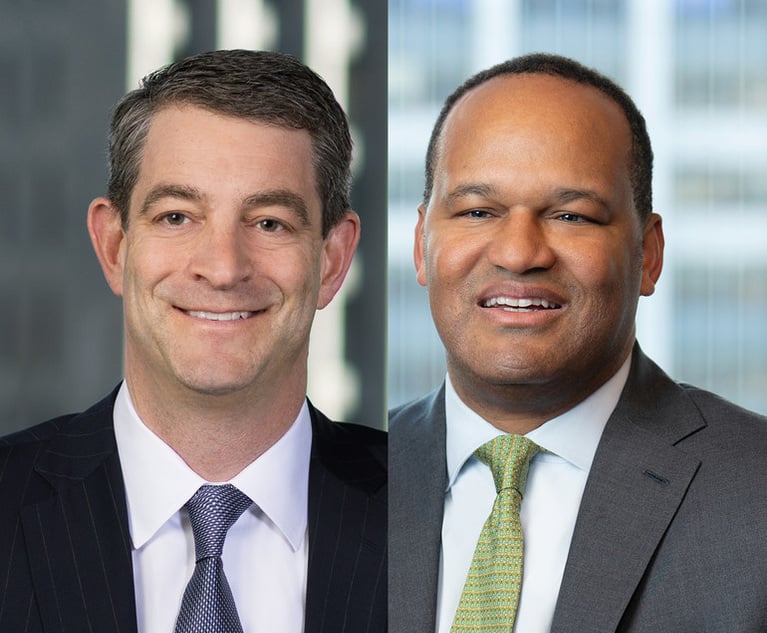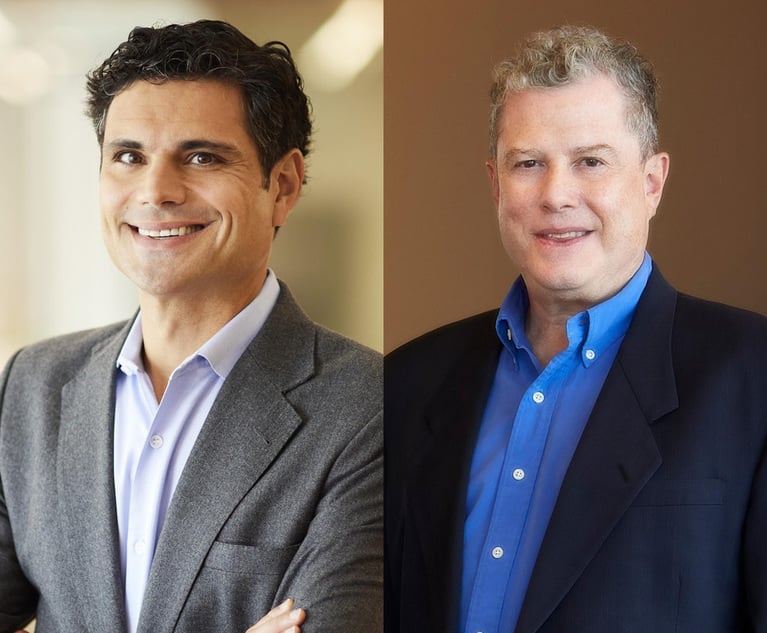As the World Burns, Law Firms Are Responding With Climate-Focused Practices
Climate change is pushing law firms to adapt their environmental practices.
January 22, 2020 at 02:00 PM
6 minute read
 A New South Wales Rural Fire Service volunteer douses a fire during back-burning operations near the town of Kulnura, located 70 kilometers north of Sydney in New South Wales, Australia on Dec. 12, 2019. Photo: David Gray/Bloomberg
A New South Wales Rural Fire Service volunteer douses a fire during back-burning operations near the town of Kulnura, located 70 kilometers north of Sydney in New South Wales, Australia on Dec. 12, 2019. Photo: David Gray/Bloomberg
Devastating wildfires in Australia early this year have killed nearly 30 people and a billion native animals and have burned millions of acres of land. The tragedy is only the latest effect of climate change, as warmer temperatures have enabled brush fires to turn into catastrophic blazes by feeding on unusually dry vegetation, climate scientists say.
Halfway across the world, U.S. law firms are responding to climate change in their own unique way, creating space for environmental practice groups to do climate-specific work and building teams specifically focused on helping entities have a measured, positive impact on the climate.
"What's happening now is the ripening of legal issues related to climate, and a proliferation across many different levels of government of different requirements, standards and expectations that are all converging at one moment to affect the legal market in a really profound way," says Brian Israel, a partner at Arnold & Porter Kaye Scholer and chair of the firm's environmental practice group.
Israel always knew he wanted to be an environmental lawyer, and after a stint as an environmental prosecutor in the Department of Justice, he looked for an opportunity in private practice to continue doing environmental work. In the last few years, he says, climate change has transformed the focus of that work: "To be an environmental lawyer in 2020 is largely to be a climate lawyer. You can't really separate it."
For law firms, climate change is crossing over into more and more aspects of traditional legal work, and many expect the amount of climate work to grow as the ramifications of global warming increasingly affect business activity.
Climate-related work draws in banking and finance lawyers for climate and carbon market transactions, particularly on green bonds and sustainability loans; corporate and governance lawyers advise on issues relating to climate change risk and climate-related disclosures; litigation partners get involved when developments with significant greenhouse emissions face court challenges; and project lawyers work on renewable energy developments.
Israel's environmental group at Arnold & Porter is large—around 50 attorneys—and these days, he says, climate-related concerns touch nearly every aspect of the group's work. Ten to 15 years ago, a large portion of environmental litigation was tied to issues like groundwater contamination, he says. Now, it's more often linked directly to the broader climate and the results of global warming.
"We've adapted, rather than grown," Israel says, adding that many longtime clients have different needs than they once did, now with a more climate-specific focus. "We're basically using the same skillset, but often in a climate-related context rather than just an environmental one."
Arnold & Porter is one of a handful of law firms collaborating with Columbia Law School and Widener University Commonwealth Law School on a book about climate laws and regulations. White & Case; Allen & Overy; Hughes Hubbard & Reed; Davis Wright Tremaine; Ashurst; Morrison & Foerster; Bradley Arant Boult Cummings; Kilpatrick Townsend & Stockton; and Wilson Sonsini Goodrich & Rosati are among more than a dozen firms that have donated their time and expertise.
At Morrison & Foerster, Susan Mac Cormac, chair of the firm's energy and social enterprise and impact investing practices, says that in the last 20 years she's seen climate work go from a niche practice to a popular one.
"It's gone totally mainstream," Mac Cormac says.
The head of the global climate change practice at Baker McKenzie, Ilona Millar, expects climate law to "grow incredibly in the next few years," thanks to emissions reductions efforts, where trillions of dollars in investment is needed. Additionally, climate work will gain extra impetus if international carbon markets get underway again, she says. Many summer clerks who interview for positions at Baker McKenzie want to work on climate change-related issues, she says.
When Mac Cormac began working on climate issues in 2001, more than 95% of her work was pro bono. Her practice is now dominated by paying clients on the sophisticated end of the market.
"The amount of work for private equity, family offices and foundations is a hundred times what it was in 2001," she says. "At first, the change was gradual, starting with pro bono work. Then, family offices wanted to be more creative. Then, foundations offering grants wanted more impact. And, finally, companies along the way started to play more and more in that space."
Impact investing of the sort that Mac Cormac advises on involves investments made "with the intention to generate measurable social and environmental impact alongside a financial return," according to the Global Impact Investing Network. She says each attorney in her practice has a specific area of focus they're passionate about, and that nearly everyone on the team touches the climate space.
But it's not enough simply to care about climate change and environmental issues. Mac Cormac says the attorneys joining her group are standouts who excel in their area of the law before coming to the team. Then, over the course of multiple years, they gain the additional skills necessary to handle meaningful work. After about four years on the team, she says, attorneys finally have the deep level of expertise needed to start specializing in the area of impact that is most important to them.
"We've had zero turnover in the group, other than people going in-house," she says. "If you let people do what they're passionate about, they stay."
For Mac Cormac, climate work is less about competition and more about collaboration. If a company her team is working with has existing counsel, she says they will work together and share their knowledge. At this point, climate work is dominated by smaller firms and solo practitioners who might not always have the resources or sophistication necessary to meet the needs of a massive, international company, she says, stressing the need for more large firms to take on this type of work.
"We have to get all of the big firms really working in this to provide the level of sophistication necessary to do this work," Mac Cormac says. "I think climate is the existential threat of our time, so it's all hands on deck."
Christopher Niesche contributed to this article.
This content has been archived. It is available through our partners, LexisNexis® and Bloomberg Law.
To view this content, please continue to their sites.
Not a Lexis Subscriber?
Subscribe Now
Not a Bloomberg Law Subscriber?
Subscribe Now
NOT FOR REPRINT
© 2025 ALM Global, LLC, All Rights Reserved. Request academic re-use from www.copyright.com. All other uses, submit a request to [email protected]. For more information visit Asset & Logo Licensing.
You Might Like
View All
'None of Us Like It': How Expedited Summer Associate Recruiting Affects Law Students and the Firms Hiring Them

Latham's Lateral Hiring Picks Up Steam, With Firm Adding Simpson Practice Head, Private Equity GC
3 minute read

Leaning Into ‘Core’ Strengths, Jenner’s Revenue Climbs 17%, Profits Soar 23%
4 minute readTrending Stories
- 1Thursday Newspaper
- 2Public Notices/Calendars
- 3Judicial Ethics Opinion 24-117
- 4Rejuvenation of a Sharp Employer Non-Compete Tool: Delaware Supreme Court Reinvigorates the Employee Choice Doctrine
- 5Mastering Litigation in New York’s Commercial Division Part V, Leave It to the Experts: Expert Discovery in the New York Commercial Division
Who Got The Work
J. Brugh Lower of Gibbons has entered an appearance for industrial equipment supplier Devco Corporation in a pending trademark infringement lawsuit. The suit, accusing the defendant of selling knock-off Graco products, was filed Dec. 18 in New Jersey District Court by Rivkin Radler on behalf of Graco Inc. and Graco Minnesota. The case, assigned to U.S. District Judge Zahid N. Quraishi, is 3:24-cv-11294, Graco Inc. et al v. Devco Corporation.
Who Got The Work
Rebecca Maller-Stein and Kent A. Yalowitz of Arnold & Porter Kaye Scholer have entered their appearances for Hanaco Venture Capital and its executives, Lior Prosor and David Frankel, in a pending securities lawsuit. The action, filed on Dec. 24 in New York Southern District Court by Zell, Aron & Co. on behalf of Goldeneye Advisors, accuses the defendants of negligently and fraudulently managing the plaintiff's $1 million investment. The case, assigned to U.S. District Judge Vernon S. Broderick, is 1:24-cv-09918, Goldeneye Advisors, LLC v. Hanaco Venture Capital, Ltd. et al.
Who Got The Work
Attorneys from A&O Shearman has stepped in as defense counsel for Toronto-Dominion Bank and other defendants in a pending securities class action. The suit, filed Dec. 11 in New York Southern District Court by Bleichmar Fonti & Auld, accuses the defendants of concealing the bank's 'pervasive' deficiencies in regards to its compliance with the Bank Secrecy Act and the quality of its anti-money laundering controls. The case, assigned to U.S. District Judge Arun Subramanian, is 1:24-cv-09445, Gonzalez v. The Toronto-Dominion Bank et al.
Who Got The Work
Crown Castle International, a Pennsylvania company providing shared communications infrastructure, has turned to Luke D. Wolf of Gordon Rees Scully Mansukhani to fend off a pending breach-of-contract lawsuit. The court action, filed Nov. 25 in Michigan Eastern District Court by Hooper Hathaway PC on behalf of The Town Residences LLC, accuses Crown Castle of failing to transfer approximately $30,000 in utility payments from T-Mobile in breach of a roof-top lease and assignment agreement. The case, assigned to U.S. District Judge Susan K. Declercq, is 2:24-cv-13131, The Town Residences LLC v. T-Mobile US, Inc. et al.
Who Got The Work
Wilfred P. Coronato and Daniel M. Schwartz of McCarter & English have stepped in as defense counsel to Electrolux Home Products Inc. in a pending product liability lawsuit. The court action, filed Nov. 26 in New York Eastern District Court by Poulos Lopiccolo PC and Nagel Rice LLP on behalf of David Stern, alleges that the defendant's refrigerators’ drawers and shelving repeatedly break and fall apart within months after purchase. The case, assigned to U.S. District Judge Joan M. Azrack, is 2:24-cv-08204, Stern v. Electrolux Home Products, Inc.
Featured Firms
Law Offices of Gary Martin Hays & Associates, P.C.
(470) 294-1674
Law Offices of Mark E. Salomone
(857) 444-6468
Smith & Hassler
(713) 739-1250










